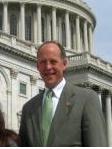 [5]Oregon Delegation Wins Suspension of Unfair EPA Biomass Regulations
[5]Oregon Delegation Wins Suspension of Unfair EPA Biomass Regulations
By Oregon Congressman Greg Walden [6]
WASHINGTON, DC— Representatives Greg Walden (OR-02), Peter DeFazio (OR-04), and Kurt Schrader (OR-05) received a letter from Environmental Protection Agency (EPA) Administrator Lisa Jackson detailing significant changes to EPA’s regulation of emissions from biomass facilities. Walden, DeFazio, and Schrader have worked tirelessly to fix unreasonable regulation of carbon-neutral biomass emissions since the EPA announced the restrictive policies.
In the letter, the EPA described three key revisions to its regulation of renewable biomass emissions.
– The EPA will complete expedited rulemaking to defer the regulation of renewable biomass emissions under the Tailoring Rule for three years
– During these three years, the EPA will analyze biomass emissions and construct a new system that addresses these emissions sensibly and scientifically
– The EPA will engage in notice-and-comment rulemaking, allowing the public to comment before final decisions are made to establish the new regulatory system
The EPA announcement responds to repeated attempts to ensure the agency treats renewable biomass fairly and scientifically under the Tailoring Rule. Walden, DeFazio, and Schrader have led several letters in the U.S. House of Representatives on the topic, the most recent of which was a December letter signed by 32 members of Congress calling on the EPA to modify the Tailoring Rule before being implemented. Without the changes, the members argued “future investment in biomass energy, job creation in rural communities, and our collective renewable energy goals” would be threatened.
“The EPA was precariously close to enforcing new job-killing regulations, and with the urging of a bipartisan congressional effort, made the right decision in reversing course,” Rep. Walden said. “Hopefully this three-year reprieve, while very welcome, does not cast a shadow of uncertainty that threatens to curb investment and job creation. I will continue to watch the EPA carefully to ensure that the new economic opportunities that woody biomass offers for rural Oregon has the opportunity to move forward.”
“This is great news after a tremendous bipartisan effort in pushing the EPA to finally acknowledge that woody biomass is different than coal. This will allow a number of projects to move forward in hard hit Southern Oregon and other rural areas of the state. These projects will create needed jobs and clean renewable energy from biomass. I am very pleased that the federal bureaucrats finally got out of the way and are allowing us to do something that makes an awful lot of sense,” said DeFazio.
“Today’s announcement is a real victory and job creator for rural Oregon,” said Schrader. “Renewable biomass not only decreases our dependence on foreign oil, but creates sustainable green energy jobs in rural communities that have been mired in recession for decades. While more work needs to be done to maximize the potential of the renewable biomass industry; this announcement is a strong step in that direction.”
Background
The Tailoring Rule, a supplement to the Clean Air Act intended to regulate sources of greenhouse gas pollution, was implemented on January 2, 2011. As currently designed, the Tailoring Rule does not distinguish between emissions from biomass facilities and emissions from dirty fossil fuel-burning facilities that rely on coal and oil.
Over the last year and a half, the delegation has written several letters and met with administration officials to ensure the Tailoring Rule fairly recognizes the carbon-neutrality of renewable biomass.
The EPA had expressed the need to make modifications to the Tailoring Rule that reflect the obvious benefits of using renewable biomass as an energy input instead of fossil fuels.
In June 2010, Walden, DeFazio, and Schrader led a bipartisan letter signed by more than 60 members of Congress expressing strong concerns over the fact that the Tailoring Rule did not recognize the carbon benefits of renewable biomass utilization. The letter called for a stay of the rule as it applied to biomass facilities until a definitive policy on biomass emissions was developed.
The EPA announcement is a major victory for the growing renewable energy sector in Oregon. It provides predictability to businesses that utilize biomass, will help create jobs and move the U.S. toward energy independence.